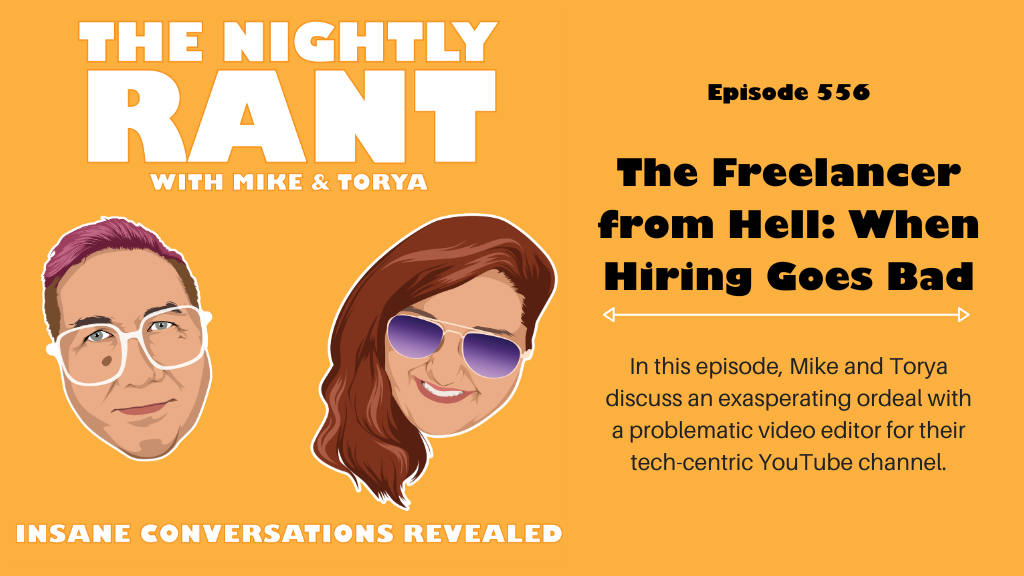We may earn money or products from the companies mentioned in this post.
The Nightly Rant Episode 556 Summary
Mike and Torya delve into an exasperating ordeal with a problematic video editor for their tech-centric YouTube channel. Despite initial promising signs, the editor's persistent pay raise demands, shoddy work, and unprofessional behavior led to a tumultuous fallout. From accusations of poor performance to shocking threats, this episode unpacks a cautionary tale about hiring freelancers, emphasizing the importance of “hire slow, fire fast”. Torya's involvement adds depth to exploring their collective frustrations and the ultimate resolution of the situation. Tune in for a gripping recount of professional challenges and lessons learned.
The Nightly Rant Episode 556 Show Notes
Navigating Freelancer Relationships: Lessons Learned from Hiring a Video Editor
Key Insights:
- Transparency with contractors is essential to maintain trust and efficiency.
- Clear, detailed style guides and communication can mitigate misunderstandings.
- Swift action is necessary when issues escalate to avoid further complications.
The Importance of Transparent Communications with Freelancers
In the world of freelancing, transparency is key. As Mike and Torya reveal in their engaging discussion, managing and delegating tasks to freelancers can be rife with challenges—especially when expectations are not met. In the case shared by Mike, a dialogue with a video editor turned tumultuous due to repeated miscommunications and an inability to meet deadlines.
“How do you ask for a raise when you know that the person’s not happy with your work?” Mike’s frustration stems from the editor’s inability to follow a clear style guide and frequent requests for salary increments. When hiring freelancers, it’s crucial to establish clear, structured communication from the start. Detailed guidelines and expectations ensure both parties are on the same page, potentially avoiding future misunderstandings.
The editor’s continuous requests for a pay increase despite failing to meet the job’s basic requirements highlights a key issue: the importance of agreeing on a fair price from the beginning and sticking to it unless performance justifies a change. As employers, it is vital to communicate transparently and assertively when expectations are not met to avoid further conflicts.
Establishing Clear Expectations and Boundaries
Mike's experience underscores the necessity of establishing clear expectations and boundaries with freelancers from the start. The lack of adherence to the style guide and deadlines points to a larger issue of comprehension and capability.
“I have to review every video a minimum of twice already. Taking you longer would have taken you to edit it yourself,” says Mike, illustrating how the editor’s inefficiency turned a stress-relief strategy into a stress multiplier. Effective freelancers should decrease the workload, not amplify it. Setting specific deadlines and clear milestones can help identify early if a freelancer can handle the task or if adjustments are needed.
Moreover, the editor’s multiple requests for raises indicate perhaps a deeper issue of unrealistic initial pricing. It’s essential to discuss thoroughly and agree on a fair rate beforehand to ensure the freelancer does not feel undervalued and the employer does not feel overcharged, maintaining a balanced professional relationship.
Addressing and Resolving Conflicts Promptly
Conflicts are inevitable in any professional relationship, but their resolution speaks volumes about both parties involved. The shift in the editor’s behavior—from demanding pay raises due to personal reasons to becoming incoherent and rude on Slack—culminated in extremely unprofessional conduct, like threatening messages over Instagram.
“He comes back and says, but I don’t want to quit. And I said, it’s too late. You’re fired.” Here, swift action was necessary. Mike’s decision to terminate the contract reflects the importance of acting quickly when boundaries are crossed or when the working relationship becomes irreparably strained. Delaying the inevitable, as Torya suggests, would have only led to further stress and more complicated conflicts.
Employers must be prepared to take definitive action when a freelancer’s behavior becomes unprofessional. This preserves the integrity of the business and sets a precedent for how future issues will be handled. Detailed record-keeping of all communications is critical in such scenarios to protect against false claims or counter-accusations, as seen when the editor falsely claimed unpaid earnings.
Importance of Protecting Business Reputation
Mike's ordeal with fraudulent reviews showcases the potential vulnerabilities businesses face when disgruntled freelancers act out. “He's lucky that I didn’t report him to the local police,” Mike mentions, underscoring the severity of the threats received.
In today’s digital age, protecting your business’s reputation is paramount. False claims and negative reviews from freelancers can damage a business’s credibility. Taking proactive steps to document all interactions meticulously can offer substantial protection. When Mike responded to the false review by offering to provide receipts, it served both as a counteraction to the false claims and a testament to his transparency and integrity.
Platforms facilitating freelance work must also take more significant steps to protect clients as much as freelancers. Trust is a two-way street; both parties need to feel secure and fairly treated within a professional transaction.
Reflecting on the ordeal, it’s clear that managing freelancers requires clear communication from the outset, establishing boundaries, and acting swiftly when conflicts arise. Integrating these practices is essential not only for maintaining stress levels but also for preserving the business’s reputation and ongoing projects. The lessons learned by Mike and Torya offer valuable insights for anyone navigating the dynamic and sometimes unpredictable world of freelancing.
| Timestamp | Summary |
| 0:15 | Struggles with a Video Editor on YouTube Projects |
| 2:41 | Contractor's Repeated Pay Raise Requests and Performance Issues |
| 5:47 | Challenges in Editing Zoom Videos with Language Barriers |
| 6:56 | Workload Disputes and Communication Challenges in Video Editing |
| 8:20 | Firing an Employee Due to Stress and Mismanagement |
| 9:54 | Navigating Freelancer Ratings and Disputes |
| 12:14 | Confronting False Claims and Social Media Drama |
| 12:46 | Freelancer Drama and Threats |
| 16:36 | Unfair Ratings and Client Protection Issues |

